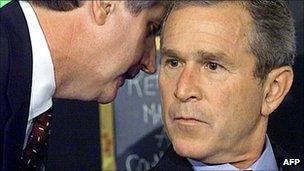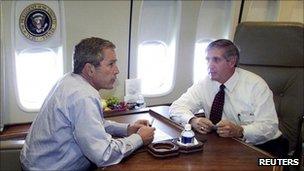9/11 anniversary: Andy Card and the attack on America
- Published
- comments
Andy Card: "I was really glad the President stayed in the classroom and did what he did"
There are so many searing images from 9/11. Just as iconic, just as memorable, is one that is not of death and destruction but a psychologically revealing moment. It is the moment when President George W Bush was told the news of the attack.
He was at the Emma E. Booker Elementary School, external in Sarasota, Florida on a routine trip to promote his educational ideas.
The man who whispered in his ear was his chief of staff Andy Card, external. I've been talking to him about that day.
Before the president joined the children for a reading lesson, the White House and the president already knew a plane had crashed into the World Trade Center, but they thought it was a freak accident.
"We thought it was a horrible accident. The pilot had had a heart attack or something and then the principal opened the door to the classroom and the president went in and the doors shut. And that same staff from the situation room came to me and said: 'It appears it was not a small twin-engine prop plane. It was a commercial jetliner.'
"And my mind flashed to the fear that must have been in the passengers' mind. I mean they had to know that the plane wasn't gaining altitude, but that's what my mind flashed to. But that was only a nanosecond because that same staff came back me and said: 'Oh my gosh. A second plane hit the other tower at the World Trade Center.'
"And believe it or not, my first thought was UBL, Osama Bin Laden. And I knew that I had to tell the president.
"You know, that is one of the difficult tasks that a chief of staff has - does the president need to know? This one was easy to answer. Yes the president needed to know.

'A second plane hit the second tower. America is under attack.'
"It couldn't have been an accident and so I made the decision to send in two facts and make one relatively obvious editorial comment. And I wanted to do nothing to invite a question or start a dialogue. I opened the door to the classroom. And I walked up to the president and leaned over and whispered onto his right ear. 'A second plane hit the second tower. America is under attack.'"
The president carried on listening to the children reading The Pet Goat, or at least he continued to sit there, a range of emotions showing on his face. Wasn't it a bit odd that he didn't just leave?
"Well I thought it was right. Number one, he did nothing to introduce fear into these very young students. They were second graders. He did nothing to demonstrate fear for the media who would have translated it to the satisfaction of the terrorists all around the world. Again he didn't scare anyone as he walked out.
"I'm sure there were lots of questions but he didn't scare anybody. When he walked into that room, the first thing he said was: 'Get the FBI director on the phone'. And we could say: "Here he is sir'. And then I tried to be cool, calm and collected. And meeting his needs rather than responding emotionally to the challenge of the day."
I am sure many people remember the sheer uncertainty about what was happening that day, and Andy Card says it was no different for the president and his team.
"The president did see the television that showed the towers collapsing. And so there was horrendous concern that the terrorists had literally murdered tens of thousands of people. And he didn't know. He didn't know if there were other attacks coming. We knew about the attack in the Pentagon."
The White House team made their way back to Air Force One, uncertain about their next destination.
"We drove quickly to the airport where the Air Force One's engines had already started, which is unusual. Usually you don't start the engine until the president is already on the plane. On the ride to the airport, we were all on our phones talking. The president was talking, I was talking. In fact, we were talking on our phones as we were running up the gangplank to get on Air Force One.
"We get on the plane and the president says he wants to go to Washington DC. The Secret Service is telling me absolutely not. And the pilot is telling me absolutely not. No Air Force One was going to be safe landing at Andrews Air Force Base.
"The most attractive option was Barkscale Air Force Base in Louisiana. It was in the middle of a high alert exercise. They were [on] exercise for nuclear attacks so they were already on the highest alert. Perfect place for us to go; we didn't want anyone to know that this is where we were going but we made the decision to go there.
"By the way Air Force One took off at an extremely steep incline, flew into 48,000ft and flew in a serpentine way, waiting for fighter jets to catch up to us to protect us.
"We were debating where to go and the president was arguing that he wanted to go back to Washington and I'm right in the middle."
MM: "So there was a bit of an argument?"
MM: "But there was a lot of criticism or some criticism of the president for not going to the White House immediately. Did you make the right decision?"
"Absolutely, the fog of war is real. People didn't know if there were other attacks coming, they didn't know how safe Washington DC was and in fact there had been some misinformation that Air Force One itself was a target. So I think we made the right decision... based on the advice and counsel from both the Secret Service and the military, to wait and understand better the nature of these attacks on America."

Andy Card says President Bush met his responsibilities as commander-in-chief from Air Force One
MM: "The sense that the president has gone missing didn't help either."
"Well he was never gone missing. He was in communication back to Washington DC. That was why we got on Air Force One where they had good communications. Not as good as we wanted but much better than on any other plane. And it was the right place to be and the president was able to meet his responsibilities not only as president but as commander-in-chief from that plane. And you should know that while he was on Air Force One, yes he was talking, he was talking to folks back in Washington DC.
"He was also making phone calls to other leaders around the world. For example he called President Putin and said: 'Mr President, don't presume that we are getting ready to attack you. Stand down, in case you are in the highest alert. We are not looking to attack you.' And so he practised a whole lot of diplomacy at the same time that he was meeting his responsibilities."
I asked Andy Card what his reflections were at the end of that momentous day.
"That the world has changed. My life as chief of staff has changed. First of all, my goal as the president's chief of staff was not to be known. I wanted to be chief of staff when no-one knew his name. When I whispered in the president's ear I didn't realise that it would be the picture of the day other than the facts the planes were hitting the towers in New York City and in the Pentagon. So I was not looking to give up my anonymity.
"I also knew it changed forever the responsibilities that President Bush would be known for his term as president. That it wasn't going to be for leaving no child behind or cutting taxes or doing a way out of the recession that he had inherited. It was going to be about how he responded to an attack on our homeland.
"So yes, it was a very significant day. It changed my life, it changed the president's life, it changed America's life and quite frankly it changed the world."
It is all very well of course saying that it was a day that changed the world. It is obviously true. American troops wouldn't have invaded Afghanistan. It's highly likely there wouldn't have been an Iraq war either.
But how does Andy Card think it changed America?
"First of all immediately after the attack we were both paranoid and pulled together. We were united. It was truly the United States of America. Every American was standing together to help those who were victims those who were helping to find the victims. We stood together in a united way against terror. And the world actually united pretty well. A lot of the allies that we didn't expect to be allies said we will be allies with you. And so that was empowering and that was a wonderful feeling to say that America has come together and the world stands with us. It was also pretty dramatic that we were paranoid because we thought there were other attacks coming and we started to look sceptical even at our neighbours.
MM: Is that sense of vulnerability, new vulnerability, still with America?
"I think it has mitigated an awful lot and time has a tendency to cause us to forget. I hope we never forget the victims that were lost on 11 September. I hope we never forget the heroes that tried to save people on 11 September, the policemen and the firemen in New York and in Washington DC.
"I hope we never forget the people who were on that flight that crashed in order to save Washington DC from another attack. I hope we never forget that. I don't care if they don't remember me. You can forget me but don't forget them. And don't forget that America is still, it's still a target that the bad guys would like to hit again. The al-Qaeda network, the terrorist organisations around the world still want to do us harm and that is why winning the war on terror is still so important and why it requires allies all the around the world to stand tall, to help make sure that terrorists have no place to find safe haven."